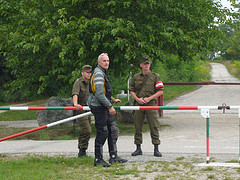You’ve just been asked for a bribe, now what do you do?
10 March 2012
Contrary to the popular belief of some inexperienced travelers, bribing is not a tool used exclusively by those who are breaking the law. In some countries, you may find yourself paying a little extra just to get a passport stamp that’s suddenly become problematic.
In fact, in some countries you’ll find it difficult to do anything useful or important without paying out a bit of cash. It’s not fun, but it’s part of the experience.
While a bribe or two is simply a reality of travel in some regions of the world, it is always done at the traveler’s risk and how you handle the situation could mean the difference between a funny travel story and something far less pleasant.
Avoiding Bribes is Step One
First and foremost, avoiding a bribe situation is the most important step.
- Familiarize yourself with the local laws and don’t break them. Remember, it’s really difficult to argue with local officials, and they have the power to detain you. A night in jail in some countries is as good as a death sentence.
- Research the local rules. In some places your language, skin color, and passport have you pre-packaged as ‘bribe-ready’, so expect that and be prepared.
- Carry a small amount of local cash in a wallet that you can easily access – keep your excess cash well hidden.
- Don’t travel with valuables and keep them well hidden you do. Claiming you have no cash while wearing designer shoes and clutching an expensive piece of electronics isn’t going to fool them (it’s even likely to make them angry).
- Don’t accept so-called ‘special access’ at any tourist spots, at your hotel, or any other place. That sort of ‘bending the rules’ only benefits the one offering it – not you. It also positively identifies you as a tourist and an inexperienced one at that, which doesn’t play nice with the locals.
- In certain countries, avoid driving completely. There are plenty of places where a tourist in a car is just a source of cash, especially if you don’t speak the language or know the local laws and customs. Driving is just asking for trouble.
Spotting a Bribe
Bribery is often introduced as a fine, an obscure fee, or an unnamed penalty and it’s useful to know the local euphemisms for a bribe. Check your travel books or ask someone you trust (consider the concierge at your hotel an option). Generally speaking, if a person keeps asking for the same thing using the same terms, especially if it is in some way connected with money or a gift, as they are holding their hand out, you can take that as a hint.
Getting out of a Bribe
Depending on the situation, you may be able to get out of paying the bribe. Just because a person has asked outright for money, it doesn’t mean they won’t back down. Try refusing to pay it and moving on dismissively. If that doesn’t work and if you know your paperwork is in order, and you are in a location where other officials are standing around (as opposed to facing a group of armed people on a remote road, for example), then politely ask to see their superior.
A few other ways to sidestep a bribe:
- Ask the person to explain the reason for their request; if they can’t make it clear (and even if they do) ask for one of their colleagues to explain.
- Playing the ‘dumb tourist’ card can get you a long way.
- Keep things very public, stand in the open, and try not to hand over essential documents unless you have to.
Negotiating a Bribe – When you have to
When you are certain you are being asked for a bribe, and you don’t see another way out, start very low – and we mean very, very low. It is for this reason you should carry small change and small local bills. In many countries, a family can eat for days on what amounts to a couple of U.S. dollars. Plus, by starting low and handing over a couple of small bills, perhaps a handful of change, you’ll send the message that you don’t have lots of money at hand. Keep a wallet with little cash in it on hand, and keep your excess cash well hidden and away from prying eyes.
Do not display anger when asked for a bribe
You may be feeling it, but don’t show it. It follows that someone who is local knows the system and if they’re willing to risk asking for a bribe, they may have no compulsion about causing you further harm at another (later) opportunity. Besides displaying anger is a sure way to reduce your chances of getting what you want, which is to get out of the situation with as little harm to your wallet as possible.
Damian Tysdal is the founder of CoverTrip, and is a licensed agent for travel insurance (MA 1883287). He believes travel insurance should be easier to understand, and started the first travel insurance blog in 2006.

